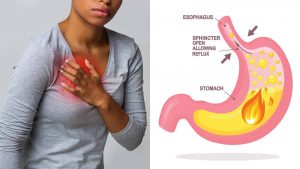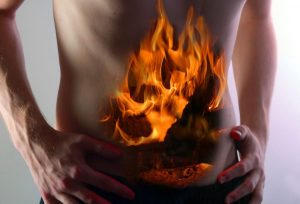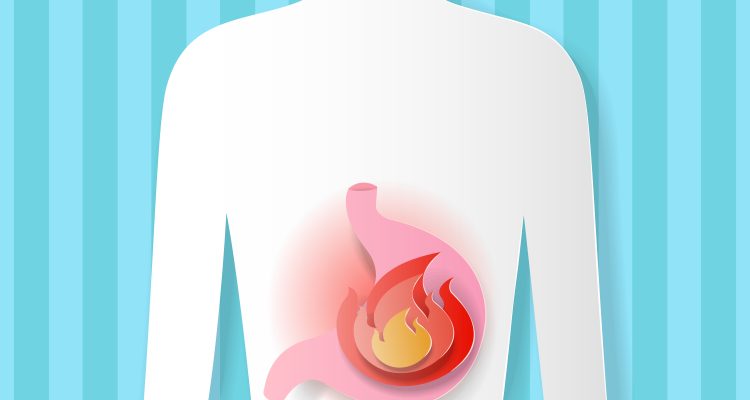When daily life is continuous speed races, there is not enough time for breakfast in the morning, pastries and coffee replace a full lunch, and a two-day calorie intake is eaten during a late dinner – it is not surprising that heartburn occurs.
What is gastroesophageal reflux disease (GERD)?
The burning sensation behind the breastbone, which is familiar to many of us, refers to one of the symptoms of a disease with a difficult to pronounce name – gastroesophageal reflux disease (GERD). With this very common disease, the acidic contents of the stomach and duodenum are thrown into the esophagus, which leads to unpleasant sensations.
GERD develops as a result of malfunctions in the disruption of the natural valve, the esophageal sphincter, which prevents stomach contents from entering the esophagus and irritating the mucous membrane. Normally, this valve is triggered in a few seconds when a person swallows, and remains closed for the entire period of food digestion. If the sphincter muscle weakens, then reflux occurs – the return release of part of the eaten. Food mixed with hydrochloric acid, getting into the esophagus, sooner or later can lead to the appearance of microscopic cracks in the mucous membrane, narrowing and even the development of such formidable diseases as cancer.
Causes of Gastroesophageal Reflux Disease
Factors contributing to the development of GERD are:
increased pressure in the abdomen (for example, during pregnancy or obesity);
haste when chewing, as a result of which air is actively swallowed;
weak tone of the lower esophageal sphincter
sometimes it occurs due to stress;
diaphragmatic hernia;
impaired ability of the esophagus to cleanse itself from food particles
the reasons for this are excessive physical stress;
drinking large quantities of drinks containing caffeine (coffee, strong tea, coca-cola);
violation of the process of gastric emptying;
smoking – nicotine weakens muscle tone;
alcohol – can damage the lining of the esophagus;
the use of indigestible foods that linger in the stomach for a long time – dishes rich in animal fats, fried and spicy.
Carbonated mineral waters may also be unhelpful if you have a predisposition to GERD.
GERD symptoms
The most common symptoms of GERD include a burning sensation behind the breastbone, which occurs an hour and a half after eating or at night. The discomfort may become more noticeable after intense fitness and overeating. Also, with this disease, belching is observed – this is the reverse exit of the contents of the stomach, which can be accompanied by a sharp sound and smell of recently eaten food. Most often, belching occurs in a horizontal position and when the body bends. Hiccups, an irritation of the phrenic nerve that causes frequent contraction of the diaphragm, can also be a sign of GERD. Retrosternal pain may also appear, which radiates to the interscapular region, neck, lower jaw and the left half of the chest.
Consequences of GERD
One of the complications of GERD, which significantly impairs the quality of life, can be vomiting of undigested food eaten shortly before the onset of vomiting. Such a symptom can deprive a person of the pleasure of eating outside the home for a long time; in this case, it will be possible to forget about cafes and restaurants for a long time. Also, GERD can lead to extraesophageal manifestations, including diseases of the respiratory system, for example, bronchitis and pneumonia, damage to the cardiovascular system, diseases of the ENT organs, and even destruction of tooth enamel and caries.
What to do to avoid heartburn
Ic important flat @ 2x
Lifestyle changes that can help relieve heartburn
If you are overweight, you need to fight it.
Stop smoking and drinking alcohol.
Avoid situations in which intra-abdominal pressure rises. These include lifting weights, wearing pressure clothing, belts, corsets, and bandages.
In the diet, you need to limit the intake of fatty foods, acidic foods (tomatoes, citrus fruits, sour juices), carbonated drinks, chocolate and coffee. Food should not be very cold or very hot.
Eat, preferably in small portions and a little more often than usual. However, the Russian recommendations indicate that this recommendation is outdated.
Avoid overeating.
Stop eating two hours before meals.
It is better to sleep on a pillow so that your head is raised by 10-20 centimeters.
For rare – about twice a week – heartburn, these measures may be sufficient treatment in combination with taking antacids.
Where is GERD Treated?
If you persistently try to ignore heartburn and postpone a visit to the doctor until later, heartburn, which is harmless at first glance, can lead to odonophagia – pain when swallowing and during the passage of a food lump through the esophagus. It is also possible to develop dysphagia – a feeling of difficulty or obstacle in the passage of food. Outraged by inattention, GERD https://en.wikipedia.org/wiki/Gastroesophageal_reflux_disease can lead to bleeding from the veins of the esophagus when blood comes out of the mouth or appears in the stool, causing it to turn black. Of course, these conditions require urgent medical attention. And in order not to bring your health to such sad consequences, it is better to consult a doctor in advance. If heartburn bothers you more than twice a week and each time after an attack you promise yourself not to delay the examination and not self-medicate, perhaps it’s finally time to consult a gastroenterologist, undergo a course of treatment and after eating you feel pleasant satiety, and not a burning sensation in breasts.
